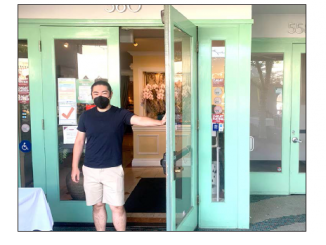
BY ALLISON LEVITSKY
Daily Post Staff Writer
The Travelodge motel in Palo Alto has been hit with a lawsuit from Scott Johnson, a quadriplegic attorney who has sued hundreds of California businesses over violations of disability access law.
The suit demands tens of thousands of dollars in damages for violations found in the two-star motel’s $150 guest rooms and parking lot at 3255 El Camino Real.
Johnson says the lot only has one parking space reserved for those with disabilities where two are required, and the space’s access aisle isn’t big enough to accommodate a wheelchair-accessible van.
The space also isn’t marked with signs bearing the international symbol of accessibility logo or “Minimum Fine $250” or “NO PARKING,” according to Johnson.
The motel’s wheelchair-accessible guest rooms only have one bed, Johnson claims, and aren’t “dispersed among the various classes of sleeping accommodations available to patrons.”
California’s Unruh Civil Rights Act, a 59-year-old anti-discrimination law, awards successful plaintiffs at least $4,000 per violation. Johnson said in his June 19 suit filed in U.S. District Court that he visited the motel 10 times between February 2017 and March 2018.
Assuming he encountered a violation during each of his 10 visits, he could claim $40,000 in damages on top of attorney fees.
Suits such as Johnson’s also cite the Americans with Disabilities Act or ADA, but that federal law doesn’t call for the payment of damages, according to Rick Morin, a Sacramento attorney who represents businesses hit by these lawsuits. Morin is not involved in the Travelodge case.
While some access suits have merit, Morin said “well over 90%” of suits over disability access are “drive-by” litigation filed by “mills” seeking payouts.
“Scott Johnson, he will file three to five lawsuits a day,” Morin told the Post. Plaintiffs can even use Google Earth to scope out access violations at a distance, he added.
Reform efforts failed in Sacramento
Efforts have been made to prevent these lawsuits with legislative reform, but Morin said they’ve failed at the state level because of trial lawyers’ influence in Sacramento.
“In California, the majority party is generally very antagonistic to efforts to fix this law, and the reason is very obvious: they have a sympathetic constituency,” Morin said. “There’s a financial incentive.”
Advocates have also been successful in urging legislators not to close off any opportunity to file suit over disability access.
“What Democrat legislator in the state of California is going to be seen as trying to take away disabled people’s rights?” Morin said. “They flood the hearing rooms with people in wheelchairs.”
Assembly Bill 150 would have required litigants to inform businesses of access violations at least six months before filing a lawsuit. It died in committee last year after concerns arose that the bill singled out one minority group for special barriers to enforcement of civil rights protections, and could violate state and federal civil rights laws like the ADA.
Some also argued that the bill would inappropriately place a burden on the plaintiff to specify how the access violations could be remedied.
The California Advocates for Nursing Home Reform also argued that the bill would have weakened residents’ ability to file suit against providers of inadequate facilities and delayed such legal action by six months.
“Even after six months, conditions for those residents won’t change if the operator can demonstrate they are ‘making a good faith effort’ to rectify the situation,” the group wrote. “It is an undeniable fact that many businesses put profits before people… AB 150 creates more than a set of stalling tactics for bad actors; it creates a ‘Get Out of ADA Liability Free’ Card.”
Prior to 2012, plaintiffs sent letters threatening businesses with lawsuits and demanding payment to avoid a lawsuit, Morin said.
Demand letters
The state Legislature changed the law to prevent these “shakedowns” by making it illegal to demand upfront payment, but the reform backfired, leading litigants to stop sending warning letters altogether and going straight to court.
But Morin said a reform to impose a notice and warning period “would just really delay the lawsuits.”
“Not all people who get those warning letters take them very seriously,” Morin said. “Our laws in this state provide a financial incentive to file these lawsuits.”
H.R. 620, the ADA Education and Reform Act of 2017, has passed the U.S. House of Representatives and is now pending before the Senate and would require that litigants provide written notice to business owners of access violations before filing suit.
But Morin said he’s skeptical of the bill’s potential impact in California because the Unruh Civil Rights Act would still provide financial incentive to sue over access violations.
In the last year, Johnson has filed similar lawsuits against the Hotel Avante and Hotel Vue in Mountain View and Menlo Gas in Menlo Park.
Johnson is not the only person filing these suits, though he’s known as one of the most prolific litigants. In the last two years, other litigants have sued Jeffrey’s Hamburgers in Menlo Park and Charley Noodle and Grill in Los Altos over similar access violations.
Johnson’s lawyers at the San Diego-based Center for Disability Access did not return a request for comment yesterday. Neither did the owner of Travelodge.



Vexatious litigants, as Johnson appears to be, are a menace to society.
Why aren’t our legislators, Jerry Hill and Marc Berman, trying to fix this. The rights of the disabled need to be protected but these lawsuits are abusive and need to be stopped.
Fear of people like Johnson forces businesses to get in the right side of the law. If you don’t want to be sued, obey the law. It’s that simple.
So Marjorie – how do you feel about illegal immigrants and sanctuary cities that break Federal laws and protect criminals?
If you don’t want to be deported and separated from your families, obey the immigration law. It’s that simple.
Pretty sure, if you are a business you have to comply with a law that’s been on the books almost 30 years.How much notice do you need.theres info all over the web on how to be compliant.I brought both of my businesses up to spec a d have seen a big increase in businesd.especially handicapped patrons
David Wong, Esq. of Berkeley, California beat Scott Johnson in federal court earlier this year. His number is 415 355 4798.
I know about these things,people sometimes don’t realize certain handicaps limits some of us from lots in life,i have very circulation in my legs,an it irks the hell out of me when I can park in a space that’s there to help me,or to check into a hotel where the tub is difficult for me,or put in a resturant far away from the self serve buffets,i walk with a cane it’s hard for me to do it,i pray these places that do this,that these people never face some of the things that we people with handicaps,i really do,an be up in age too
Frank, I don’t think Marjorie voiced an opinion about immigration. Why would you bring that up?
Since she’s all about the law, I’d be interested to hear her views on other laws.
Didn’t know Marjorie was an undocumented immigrant, Frank. Tell us more.
Where in my reply did it say that?
BTW, an “undocumented immigrant” is an illegal immigrant. Trying to smooth it over with fancy words doesn’t make it less illegal. I guess we know your views on that.
It’s amazing how liberals are oh-so-about-the law…except when it comes to illegals who break Federal law. Hypocrites.
Since she’s all about the law, I’d be interested to hear her views on other laws.
Frank, you’re steering a conversation about disabilities into your own issue about illegal immigration. You may be obsessed with illegal immigration but other people don’t care. Don’t give me a speech about how you’re making America great again by kicking out people who sneaked into the country, I don’t have an opinion about that and I don’t like getting into arguments with blowhards.
I’m not “obsessed” with illegal immigration. I wouldn’t call one post an “obsession”.
As far as your hurtful “blowhard’ ad-hominem insult, I’m surprised you haven’t been removed from this conversation by mods.
Oh, come on Frank, I’m sure this isn’t the first time somebody called you a blow-hard. You’re probably very political and people can’t stand listening to you. Look at what you’ve written above. Who would sit around and listen to that blather?
You sound like a truly horrible, hate-filled person.
Have a great weekend.